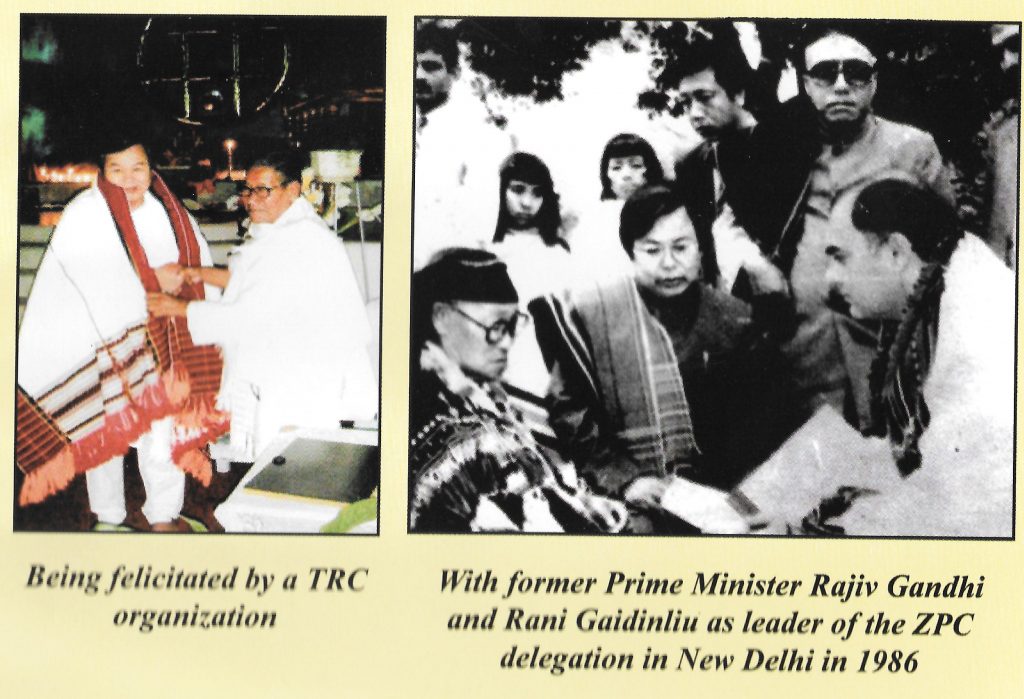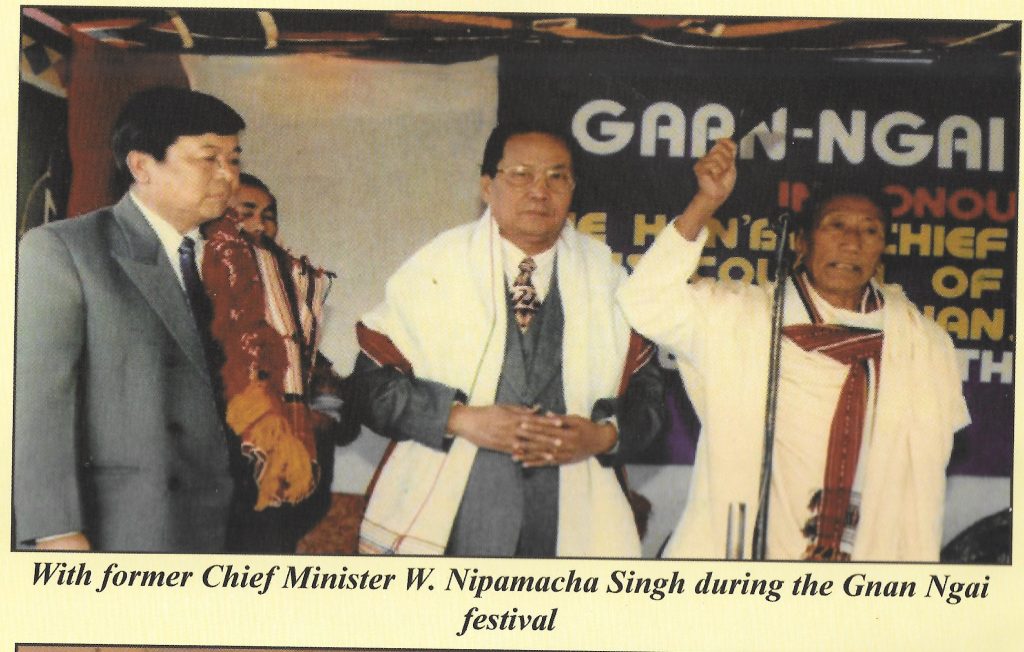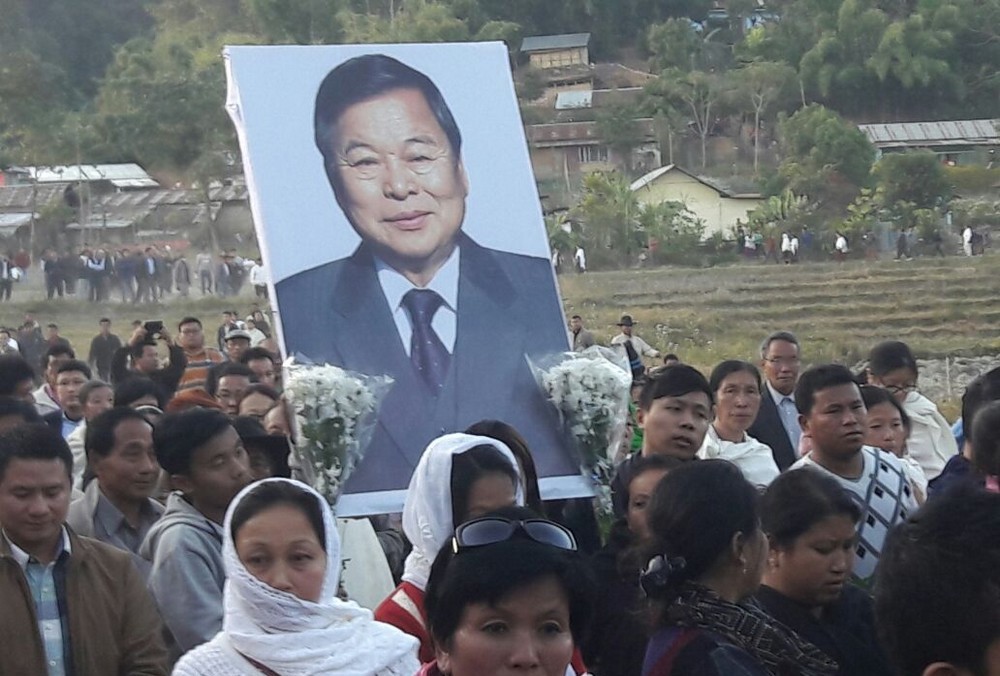Naga Republic Feature
To the world, he was “Oja Gangmumei”, a teacher, a politician, a social activist, a friend, a philosopher and guide. Prof Gangmumei Kamei was truly an extraordinary man ahead of his times. With a brilliant academic record, oratory skills, scientific temper, humanistic approach, groundbreaking research work, humble attitude and affable nature this historian turned social worker cum politician wore many hats.
Fondly remembered by fellow academics, friends and family for all that he was to them, there are many things to celebrate about him. A quick reading of the commemorative book on Prof Gangmumei Kamei’s 1st death anniversary ( 5th Jan 2018) titled “Reflections” is enough to convince the reader that Prof Kamei was an extraordinary man ahead of his times.

An ardent proponent of social harmony and cultural integration, he co-founded the Manipur Cultural Integration Conference (MCIC). Concerned about the growing divisions in a multi-ethnic state like Manipur, he worked hard to develop a sense of brotherhood between the hills and plains people of Manipur.
He was in the forefront during the times of communal crisis such as Manipuri-Outsiders, Kuki-Naga crisis, Paite-Kuki or the Meitei-Pangal communal tensions. Som Kamei, the elder son of Late Prof Gangmumei recalls the times when he himself used to get calls from the CMO or Ministers office or from Chief Secretaries Office in Manipur asking where his father was and how to get in touch with him as soon as possible. Prof Gangmumei was much sought after during challenging times of communal tensions, humanitarian crisis or historical and academic disputes.
“What I admired him the most was for one ability—his capacity to solve problems. He has resolved innumerable problems whether it’s a small petty dispute between individuals, families, communities, parties, administrative or political problems confronting the state or the country”, recalls Som, who is an Indian Postal Service officer.
Prof Gangmumei was especially concerned about the welfare of the neglected tribal and indigenous people which led him to do research on historical figures like Jadonang, Rani Gaidinliu and Hijam Irabot Singh and bring them to the national consciousness.
He is also credited for starting the Zeliangrong People’s Convention (ZPC) to highlight the plight of the Zemei, Liangmeis and Rongmeis spread over in the states of Assam, Manipur and Nagaland and made Rani Gaidinliu its leader in the 1980s. He was proud of the indigenous culture and practices which he articulately defended, “in order to preserve and propagate it against the threat posed by western proselytizing religious groups”. Through his writings in the academic world, he debunked the Animist theory of tribal religion and termed them as Primordial and pure religion.”
According to Prof N. Joykumar Singh, a former student and colleague, a characteristic feature of Prof Kamei was his “crystal clear concept of the importance of regional identity in Indian politics.” Calling regionalism in Indian polity a dialectical response to the hegemonistic centralism of the Government of India, he writes that Prof Kamei was of the view that regionalism within the parameters of Indian nationalism is a contemporary reality. Therefore, regionalism does not mean parochialism and xenophobia and hence, Indian nationalism has to come to terms with regionalism in order to give a new outlook to the body of politics.

His friend, Jagdamba Mall highlights about how Prof Gangmumei had felt that there was a need to generate greater interest in the heritage of the north-east in order to build bridges of understanding. According to Prof Kamei, the areas of immediate need to be identified and implemented were publication of relevant literatures, socio cultural exchanges, enhanced tourism, pilgrimage to holy places and its development, preservation and protection of places of archaeological importance, improvement of roads, rail and air connectivity, enhanced eco and medical tourism, sustained economic development, establishment of universities and medical colleges etc.
Apart from these concerns, Prof Gangmumei’s views on religion were also rooted in his regional identity. A lifelong follower of the indigenous religion Tingkao Ragwang Chapriak (TRC), Kamei supported his claims that TRC was a historically evolved religion. It includes a set of beliefs concerning the cause, nature and purpose of the universe and human life involving devotional and ritual observances to regulate the relation between God and His creation, especially humankind. This religion had no founder but through the ages, the law givers, diviners and prophets made the revelation of God’s wishes and advice to men and society.
Primarily a historian, Prof Kamei’s life was honoured by his family starting the Gangmumei Kamei Foundation under whose aegis the 1st Gangmumei Kamei Memorial Lecture was held on the 6th of January, 2018. J.B.Bhattacharjee, Chairman of Institute of Northeast Studies, Kolkata delivered the lecture titled, “Exploring Manipur’s Past- Remembering Gangmumei Kamei and His Works.” This lecture throws light on the immense contributions Prof Kamei had made in his field of academic study, History, particularly Manipuri history.

Calling him a “legend” at crafting the history of Manipur whose mission in life was to explore the past of his state and his people; his friend lists the many books written by him. Apart from the books, research articles, projects, lectures, and other intellectual and cultural contributions too numerous to mention are also highlighted.
Every research paper he wrote, every project he guided and any research topic he assigned to his M.Phil or Ph.D students was intended to introduce a new area or theme in Manipur’s history and culture- or to bring into focus a tribe or a community or a social category or institution or religious and cultural practice or the role of some remarkable personalities of Manipur. In his interpretation of history, Prof Kamei insisted on sources as well as rational interpretation of the sources.
Som Kamei sheds light on his father’s character as a human being. “Baba” as he was known to his children, was not only their mentor and guide but also their best friend. He was always humble and down to earth with everyone he interacted with. Nor did he speak ill of his opponents in politics or people who betrayed his trust. It was only when his integrity was doubted that he became stubborn and refused to forgive.
“My father was a natural teacher and a sharer of knowledge. He used to tell us that he always wanted to be a teacher and nothing else. The rest of his activities whether it is politics, social or in cultural field, it was a natural extension of his concerns or interests which he felt as a teacher”, says Som.

Funeral service of Professor Gangmumei Kamei at Namching, Keithelmanbi on 06 January 2017 :: Pix – Agui Kamei/E-Pao.Net
Recalling an incident when he was an opposition MLA in the Manipur State Assembly, Som mentions how his father had quite a reputation as a fiery opposition MLA and used to take the Govt. policies to task in the Assembly. “Many ministers were quite naturally scared to face such a formidable opponent and use to avoid him. The then Chief Minister Shri Rishang Keishing use to advice his ministers to be not scared of him but rather listen to him as a student and take his advice in a constructive way and make the necessary changes”.
That was the type of influence the teacher in him had in his role as the politician. Prof Gangmumei remained a lifelong teacher to all. A very liberal and secular man who believed that all resources whether it is knowledge or material should be shared with others, the rich heritage he has left behind in academics, politics and society will go a long way in enabling future discourses.
For the North East region in particular the life work of Prof Gangmumei remains relevant as the region looks to peaceful resolutions of issues. His message for peace based on equality and respect for each other and the belief that he held, of problem solving through dialogue and discussions, is even more imperative for the future.
Highlights
Academic career
Kamei was born in Imphal, and taught history at Manipur University. He was regarded as an expert on the history of Manipur.
Political career
Gangmumei Kamei was the founding president of the Federal Party of Manipur which was formed in the year 1993.
He was elected as a Member of the Legislative Assembly in the year 1995 and again in 2001 Manipur Assembly. He was the minister for Forest, Environment and Higher Education and has held important portfolios in the then Manipur Govt. led by Shri Nipamcha Singh in 1998 and 2001.
Kamei joined the BJP in 2012 and contested the outer Manipur Lok Sabha Constituency. However, he lost and later led development of party policy. Prof. Gangmumei held membership in the Indian Council for Historical Research (ICHR) and the Regional Planning Body of the North Eastern Council (NEC).
He died on 5 January 2017, aged 77.
Source: Wikipedia







 An orbiting message of peace
An orbiting message of peace Meet R.N. Ravi, who is mediating peace with the Nagas
Meet R.N. Ravi, who is mediating peace with the Nagas The Top Viral YouTube Videos of 2017
The Top Viral YouTube Videos of 2017 What Does Your Face Say About Your Health?
What Does Your Face Say About Your Health?










Leave a Reply
Your email address will not be published. Required fields are marked (required)